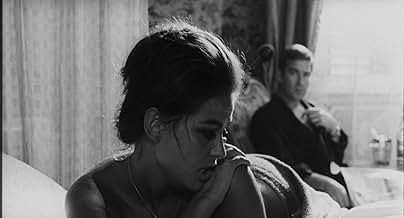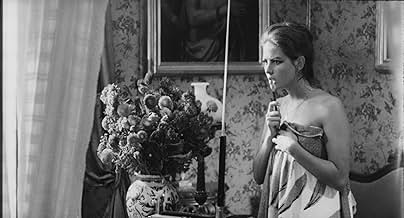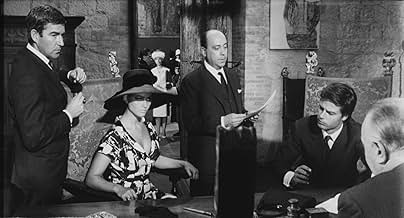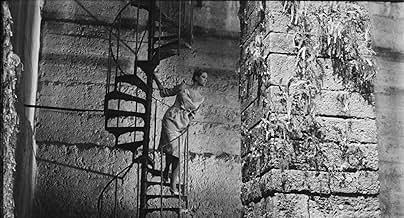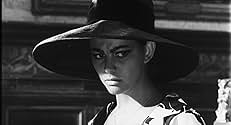IMDb RATING
7.1/10
2.4K
YOUR RATING
Sandra returns to her childhood village to take care of family business, but her childhood memories and secrets soon overcome her.Sandra returns to her childhood village to take care of family business, but her childhood memories and secrets soon overcome her.Sandra returns to her childhood village to take care of family business, but her childhood memories and secrets soon overcome her.
- Awards
- 3 wins & 2 nominations total
Oscar Brazzi
- Party Guest
- (uncredited)
Glenn Saxson
- Party Guest
- (uncredited)
Featured reviews
Great film about dark secrets and forbidden desire. Luchino Visconti depicts the life of a beautiful woman caught between her past and her present. Underneath her beauty she turns out to be filled with ugly and painful memories. Sandra (played by Claudia Cardinale) struggles with obscure feelings of guilt, alienation and questionable longings. After she takes her husband to her childhood home she finds herself thinking about her painful past. When her somewhat estranged brother shows up things turn out to be more obscure. Hidden secrets and feelings from the past seem to float to the surface once again. The o so beautiful Sandra turns out to be a complex and mysterious woman. A little more raw than most of Visconti's work, but still beautiful and authentic. A film about a woman struggling with her demons, both inside and outside of her.
I am sick to death of all the ridiculous titles this great film has been given. ' Of A Thousand Delights ' is absurd meaning nothing and ' Sandra ' is banal. To make it clear the title is a reference to a Leopardi poem eloquently quoted by Jean Sorel in the film. The poem expresses despair, and Jean Sorel says the words to his sister Sandra played by Claudia Cardinale. Why is he in despair ? He is in love and that love is forbidden by society. His suffering is appalling to watch, and given that Luchino Visconti was homosexual Sorel's beautiful face and body is filmed erotically, and the film could have been called ' Gianni,' given that Sorel as well as Cardinale are our main focus of attention. But of course that would not have brought the audience in. Other reviewers have given away a lot of the story so I will not follow that path. Cesar Franck's ' Prelude, Choral and Fugue ' for piano is delicately used; underlining the passions of hatred and love in the film and personally I believe Visconti never achieved such perfection of choice in any of his other films. The music is not manipulative as Mahler's Fifth Symphony in ' Death in Venice ' ( maudlin to the point of nausea ) or the dreadful score underlining ' The Damned '. In ' Vaghe Stelle Dell' Orsa ' everything is right, and the use of black and white photography unsurpassed. The nearest film that comes close to it is ' Rocco And His Brothers '. Now I will give an opinion that may seem heresy to some, but Jean Sorel was the finest and most physically beautiful actors he ever cast, and his beauty and talent far surpassed that of Alain Delon in either ' The Leopard ' or ' Rocco And His Brothers '. Delon was in my opinion cold and passionless, better suited to Jean-Pierre Melville's icy characters, but as in all human subjectivity, others will disagree. As for Claudia Cardinale her beauty and interior force explodes on the screen with a power rarely seen on film. She is definitely Electra to Sorel's Orestes. Finally Marie Bell, an extraordinarily fine actress as their tormented mother, exuding guilt and hatred in equal measure. This masterpiece ( arguably the best of Visconti's films ) is strangely underrated. It demands close attention, as it is so full of ambiguities and should be seen more than once. Visconti was a variable director, sadly resorting to ' Camp ' in later films and sometimes toppling into vulgarity. I feel his later judgement of choosing inferior actors and overloaded imagery overshadowed in the public mind the excellent work of his earlier films, of which ' Vaghe Stelle Dell' Orsa ' Is the high point.
An uneven entry in the Visconti canon, "Sandra Of A Thousand Delights" comes directly after "The Leopard", and while I consider "The Leopard" a masterpiece, it was still a film where Visconti was developing as a director, not really reaching the masterly stylistic highs of "The Damned" or "Death In Venice", but with a majestically deep plot that made up for any directorial deficiencies.
Now, "Sandra Of A Thousand Delights" is still a point in Visconti's career where he's developing as a director. He's close but he's not quite there. Shot in black and white, and with an overly dark photography that emphasizes the desolate feel, even though this is a highly intense drama - perhaps too dramatic for it's own good, it doesn't have the necessary substance to back up the plot. In the end it's just a family drama and nothing more, even if it's a forceful one: Sandra reunites with her family on the eve of her father's memorial service but there's two dark secrets lurking in the shadows; her incestuous affair with her brother, and her adulterous mother's dereliction of her husband (Sandra's father) in a concentration camp.
Now, "Sandra Of A Thousand Delights" is still a point in Visconti's career where he's developing as a director. He's close but he's not quite there. Shot in black and white, and with an overly dark photography that emphasizes the desolate feel, even though this is a highly intense drama - perhaps too dramatic for it's own good, it doesn't have the necessary substance to back up the plot. In the end it's just a family drama and nothing more, even if it's a forceful one: Sandra reunites with her family on the eve of her father's memorial service but there's two dark secrets lurking in the shadows; her incestuous affair with her brother, and her adulterous mother's dereliction of her husband (Sandra's father) in a concentration camp.
After watching "Sandra...", for the first time in mi life I wanted to know who the director was. It was 1966 and me 15, so until that moment, I was only interested in who starred what but never fully understood the director's work enormous importance. Since then, Visconti not only became one of my favorite directors ever but a parameter when judging a film. Actually, I had seen The leopard years before, when I was to young to notice more than the beauty in Cardinale and the sumptuous sets. About "Sandra" I still remember vividly not only how beautiful and glamorous Cardinale looked but how handsome and elegant Sorel was; how mysterious the whole black and white atmosphere was and the intriguing plot... which I didn't fully understood because even if the action seemed to say something, the subtitles said something else!. I thought then my mother was right when she used to tell me: You are too young to understand this and that. Well, not without relief, I learn, years later, than the subtitles had been made in Spain, during the Franco's days, so its censorship had erased all incest traces. After that, a new copy was made to match subtitles and story (and thats, thankfully, what you can find, at least in Spanish!). But even after so many years, and in my adulthood, I find Sandra as magical as the first time and still is one of my favorite movies, as many Visconti's works like Rocco and his brothers, Death in Venice or The dammed, as well, of course, The Leopard.
Luchino Visconti often dealt with the disintegration of family in his films; The Damed, The Leopard, Conversation Piece.. The stories were tragedies and only in Bellissima (1951) the family sticked together in the end. Sandra (Vaghe stelle dell'Orsa...) is also a film about this, but specifically about an aristocratic family full of betrayal, decay and immorality.
Incest is a leading theme in Sandra; we are given clues about it throughout the film, but not a definite proof. The affair of the siblings remains in the shadows and there's something odd in the relationships between the children and the parents. Visconti first approaches this controversial theme calmly, showing it as a small thing - we are not told much about it. But then he increases it to enormous dimensions.
Luchino Visconti sets this story to a dying city around a aristocratic class that is dying out. Great tragedies, misfortunes and decay lead this class to extinction. Already in Senso Visconti achieved an aesthetic revolution, but he continues this in Sandra with a political and ethic revolution. Sandra is not the easiest film by Visconti and many people in the theater seemed to neglect it. In the beginning I found it a little unreachable and absurd but it grew up to be a beautiful allegorical description of the decay of an aristocratic family.
Incest is a leading theme in Sandra; we are given clues about it throughout the film, but not a definite proof. The affair of the siblings remains in the shadows and there's something odd in the relationships between the children and the parents. Visconti first approaches this controversial theme calmly, showing it as a small thing - we are not told much about it. But then he increases it to enormous dimensions.
Luchino Visconti sets this story to a dying city around a aristocratic class that is dying out. Great tragedies, misfortunes and decay lead this class to extinction. Already in Senso Visconti achieved an aesthetic revolution, but he continues this in Sandra with a political and ethic revolution. Sandra is not the easiest film by Visconti and many people in the theater seemed to neglect it. In the beginning I found it a little unreachable and absurd but it grew up to be a beautiful allegorical description of the decay of an aristocratic family.
Did you know
- TriviaOne of the first films in which Claudia Cardinale, who was born in Tunisia and whose first language was French, dubbed herself in Italian.
- Quotes
Gianni Wald-Luzzati: Why can't you be honest for once? Did God tell you to become a nun? Did he tell you to get married and that would satisfy you? Did he tell you that nun's are sick with desire and frustration? That they're willing to mortify their flesh? Now, why must you torment yourself? Why should you fill so full of guilt? So wretched and alone?
- ConnectionsFeatured in Visconti (1967)
- SoundtracksPrelude, chorale and fugue
Written by César Franck
- How long is Sandra?Powered by Alexa
Details
- Release date
- Countries of origin
- Official site
- Languages
- Also known as
- Vagues étoiles de la grande ourse
- Filming locations
- Geneva, Canton de Genève, Switzerland(opening sequence: party at Sandra and Andrew's apartment)
- Production companies
- See more company credits at IMDbPro
Box office
- Gross worldwide
- $927
- Runtime
- 1h 45m(105 min)
- Color
- Sound mix
- Aspect ratio
- 1.66 : 1
Contribute to this page
Suggest an edit or add missing content

